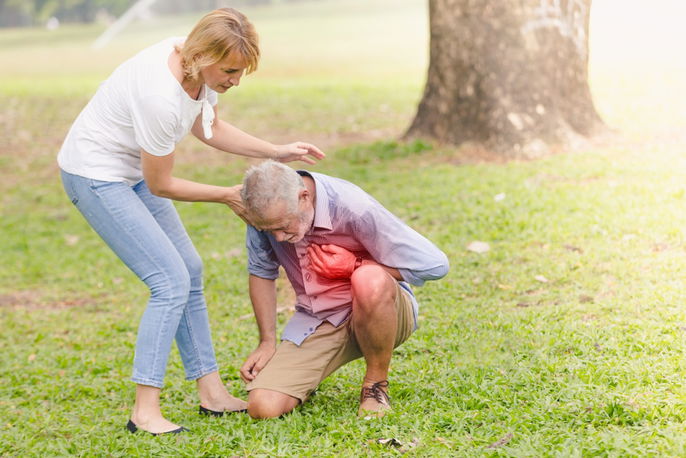Cardiac arrest can be sudden and may not present with any symptoms. Sometimes, however, some symptoms may appear before it occurs. Some patients may report chest pain that may be described as pressure or tightness, which may radiate to the back, shoulders, arms, neck or jaw. Many people may also have shortness of breath, dizziness, nausea, stomach pain or cold sweats.
It is important to take the person immediately to the emergency room or call an ambulance whenever cardiac arrest is suspected.
Cardiac arrest can also be known as cardiorespiratory arrest or sudden cardiac arrest and happens when the heart stops beating. It is important to assess whether the person is breathing and, if not, to start CPR.

Common symptoms
The main symptoms of cardiac arrest are:
- Severe chest pain described as pressure, burning or tightness
- Severe chest pain that worsens or radiates to the back, shoulders, arms, neck or jaw
- Intense shortness of breath with difficulty breathing
- Heart palpitations accompanied by chest pain and a feeling of fainting
- Fainting associated with shortness of breath or chest pain
- Difficulty speaking clearly and/or difficulty moving limbs.
Patients are at an even higher risk for cardiac arrest if they experience more than one of these symptoms at once. You should proceed immediately to the hospital or call an ambulance. Patients who lose consciousness should be assessed to see if they are breathing. If the person is not breathing and does not have a palpable purse, chest compressions may be necessary.
Why stomach pain happens
Some patients with life-threatening heart conditions may report stomach pain, indigestion or even heartburn. Decreased blood flow to the heart can lead to pain or pressure that radiates to the upper abdomen, which can be confused for a stomach ache. This occurs because the vagus nerve, a large nerve of the central nervous system, innervates many organs in the body and branches into both the stomach and the heart.
When heart cells becomes damaged or die from lack of oxygen and blood, these cells will send out biochemicals that stimulate the nearby vagus nerve, in the center of the chest. This stimulation can be interpreted as pain in the area, which can radiate along different branches.
To tell the difference, gastric issues will usually be accompanied by burping, abdominal bloating and gas, while heart issues will cause a squeezing sensation in the chest, shortness of breath and pain to other areas (like the arms or jaw).
First aid for cardiac arrest
The following interventions are advised for patients who present with symptoms of cardiac arrest:
- Call an ambulance, by dialing 911 (or 999 in the UK).
- Check whether the person is breathing. Place your cheek close the nose and mouth to listen for respiratory sounds, while also looking at the chest for breathing movement.
- If the person is breathing.
- If breathing, position in him/her in prone position and wait for medical help. Continue to check that the person is breathing.
- If not breathing, and the person also does not have a palpable pulse, begin chest compressions.
- To complete chest compressions:
- Stack both hands on the middle of the chest between the nipples and interlace your fingers
- Begin compressions with your arms straight, being sure to press down into the chest about 5 cm.
- Continue compressions until medical help arrives, at a rate of about 2 compressions per second.
Mouth-to-mouth respiration can be done for every 30 compressions. Exhale twice into the affected person’s mouth, being sure to pinch their nose. However, this step is not necessary and can be ignored if the victim is a stranger if you do not feel confident enough to perform breathing. If you do not perform mouth-to-mouth respiration, you should continue with compressions until help arrives.
Risk factors
Although it can occur for no apparent reason, cardiac arrest is most frequent in people with heart diseases, like:
- Coronary artery disease
- Cardiomegaly
- Malignant cardiac arrhythmia left untreated
- Cardiac valve problems
The risk for cardiac arrest is also higher for people with a history of smoking, high blood pressure, illicit drug use or a sedentary lifestyle.
Possible consequences
The main consequence of cardiac arrest is death, however not all cases of cardiac arrest become fatal. Death is more common in patients who remain pulseless for a prolonged period, as a heart pulse is needed to pump blood and oxygen to all organs, including the brain.
Patients who are treated promptly will have a decreased probability of consequences, but it will also depend on each person’s individual health status. In some cases of cardiac arrest, some patients may also develop neurological changes, like memory loss or difficulty speaking.






























